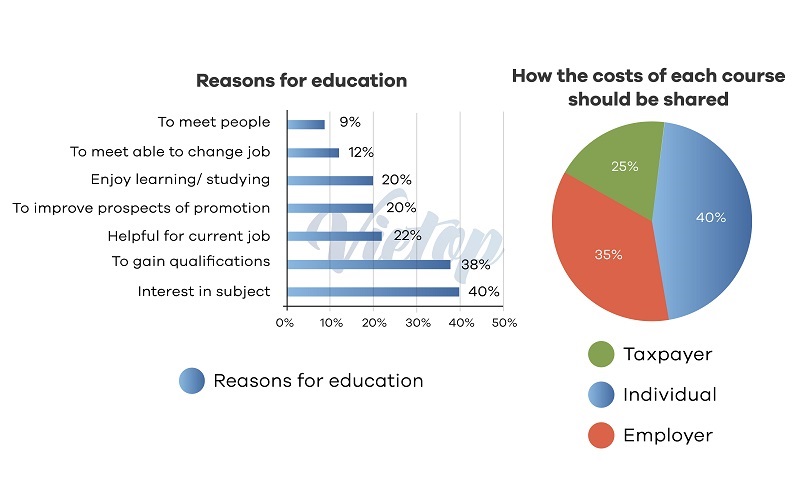Vậy nên, hôm nay Vietop sẽ gửi đến bạn bài mẫu EDUCATION Task 1,2 về chủ đề này, cùng xem và lưu lại để ôn tập và rèn luyện kỹ năng IELTS Writing nhé!
Task 1:
The charts below show the results of a survey of adult education. The first chart shows the reasons why adults decide to study. The pie chart shows how people think the costs of adult education should be shared.

The bar chart displays why adults opted to study, while the pie chart depicts people’s thoughts on the tuition fee distribution of the study mentioned before.
Overall, the two primary reasons why individuals have maintained their education, according to the poll results, are because they are interested in subjects and to get a degree. It should also be noted that the majority of school expenditures should be covered by individuals themselves, according to the study.
It can be shown that the two primary reasons why adults continue their education are because they are interested in the program and to get a certificate, since these two factors accounted for 40% and 38%, respectively. Meanwhile, the percentages of respondents who said the survey was useful for their present work, improved their prospects for advancement, or that they like learning ranged from 22 percent to 20 percent. The percentage of persons who study for the goal of changing employment or meeting new people was less than 15%.
In terms of course fees, 40% of poll respondents believe that adult education costs should be borne by individuals. Only one-fourth feel it should be collected from taxpayers’ money, while over a third say their employers should bear the obligation.
- Opt (v): lựa chọn
- Borne (quá khứ của Bear): chịu đựng
- Obligation (n): nghĩa vụ
Xem thêm: Giải bài mẫu IELTS Writing Task 1, 2: Job satisfaction
Task 2:
Subjects such as Art, Sport and Music are being dropped from the school curriculum for subjects such as Information Technology. Many children suffer as a result of these changes. To what extent would you support or reject the idea of moving these subjects from the school curriculum?
Some universities have changed their curriculum and prioritised technological topics over fields of knowledge including Arts, Music, and Sports, causing many students to suffer. I fundamentally disagree with the concept of abandoning these vital subjects in order to promote technology, which would be elaborated in the following essay.
To begin with, not all pupils are capable of dealing with technological issues. This is because some people are interested in computers while others are more interested in music, drama, reading, acting, singing, and so on. Involving pupils in extracurricular activities also helps them improve their attentiveness, which helps them achieve academically. A youngster with interests in history, theatre, and the arts, for example, may find such talents valuable when deciding on a vocation.
Similarly, as compared to students with merely technical degrees, youngsters with traditional backgrounds and interests in arts, music, and history have more prospects to create a career. Furthermore, integrating disciplines like Arts, Music, and Sports might be useful to youths in the long term. Sports help people stay active and live a healthy lifestyle. Furthermore, leisure activities are valued higher in various educational institutions and businesses, which increases the chances of pupils being admitted to a reputable college. To illustrate, many celebrities in Vietnam have studied at prestigious institutions and are now well-known in society.
To summarise, I oppose the intention to remove extracurricular topics from the curriculum, as this may assist pupils enhance their mental health and general personality development. Furthermore, this opens up a plethora of prospects for them in the future.
- Field of knowledge (n): lĩnh vực, ngành học
- Extracurricular activities (n): các môn học ngoài khung chương trình chính
- Technical degree (n): bằng cấp chuyên về kỹ thuật
- Prestigious institution: cơ sở đào tạo danh tiếng
source https://www.ieltsvietop.vn/tu-hoc-ielts/writing/writing-samples-education/
Nhận xét
Đăng nhận xét